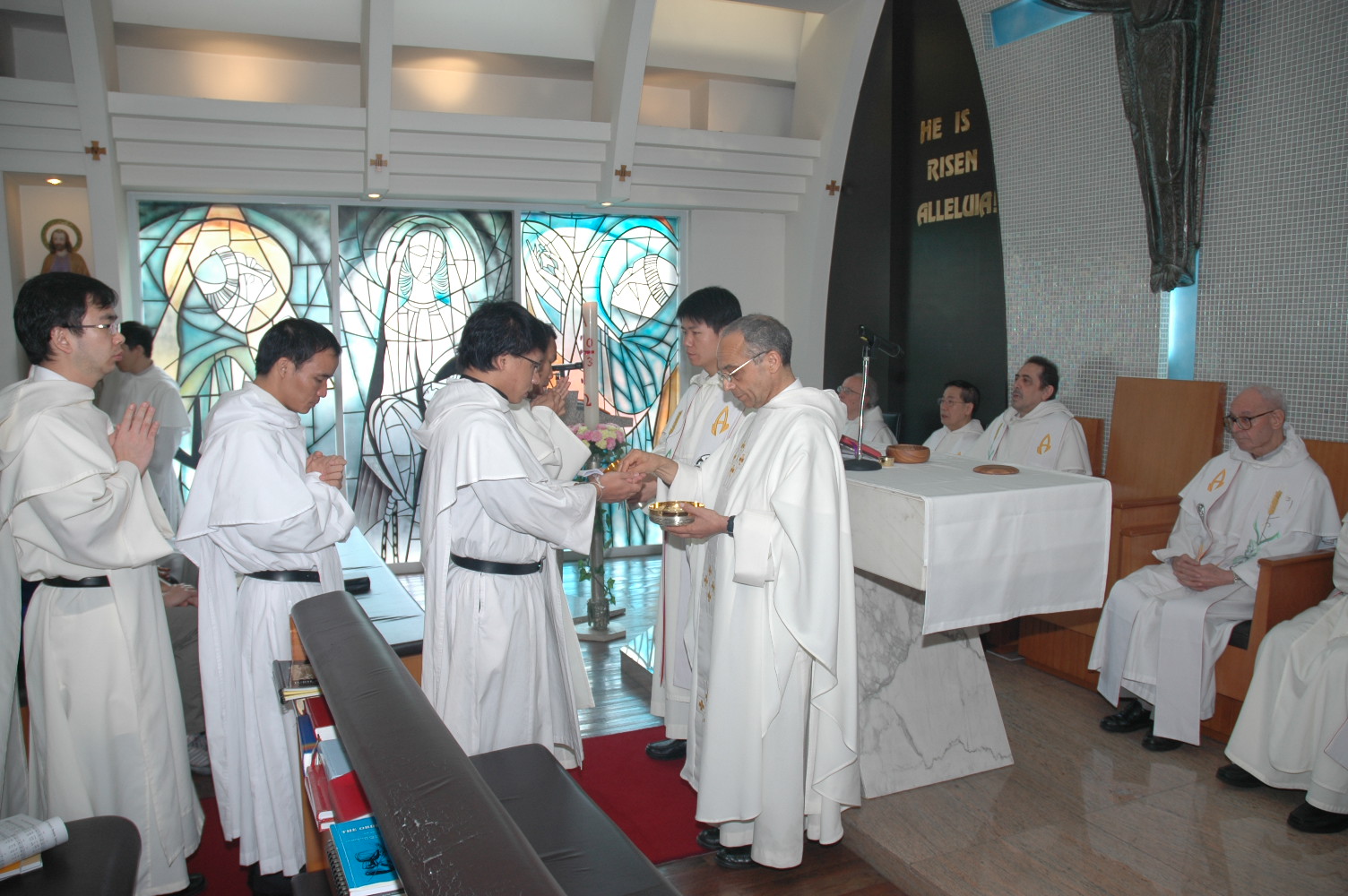
Accompanied by the Assistant for the Asia/pacific Region, the Master of the Order of Preachers made a canonical or formal visitation to our St. Dominic’s Priory. Fr. Bruno Cadoré, OP Master of the Order, and Fr. Vincent Lu, OP, Assistant to the Master for our Region visited our community On May 3-6, 2013.
On May3-5, Fr. Bruno and Fr. Vincent held common and individual meetings and dialogues with the solemnly professed brothers – the seven priests. Likewise, they also met as a group and one by one the simply professed brothers – all students. The focus of our dynamic fraternal conversations were our Dominican and missionary vocation, the centrality in formation of a “Dominican culture,†the identity of our missionary Province, missio ad gentes also as dialogue of the Gospel with the respective cultures, the present reality and its hopeful future – a missionary Province in the midst of the Order. Fr. Bruno said that “the work of the Province is very important for the Order†and encouraged all of us  to continue working and ministering with renewed vigor and dynamism
On May 5, the 6th Sunday of Easter, Fr. Bruno presided the concelebrated Mass and preached the homily centered on the readings of the liturgy of the day. (The homily is published in our web page)
On May 6, the two visitors made a visit to St. Paul’s School, a Diocesan school run by three of our Dominican brothers.
Fr. Vincent had visited us previously a few times, while Fr. Bruno for the second time. The first time of our Master of the Order was in January 2011. This first visit was not a formal but, as he himself called it “a fraternal visit.†We can say gladly that the second visit, though formal, was also fraternal, and very enriching, and truly pleasant. Indeed, the visit of our superiors was indeed a great blessing from the Lord, and hopefully a springboard for the mission and commitments of our brothers as students, school administrators, formators and professors.
The unique visit to our convent was part of the canonical visitation of the Master with his Assistant for the Asia-Pacific Region to our Dominican Province, the missionary Province of Our Lady of the Rosary. The one month-long visit started in Japan on April 8, 2013 continued in Korea, Taiwan, Philippines, East Timor, Singapore, Myanmar, Macau, China and Hong Kong where it ended on May 8, 2013 with a meeting of the Council of the Province headed by our Provincial Fr. Javier Gonzalez, OP. (By the way, the two brothers visitators also visited the houses of the Philippine Dominican Province in Indonesia and Sri Lanka)
Â
Â
Â
Â
Â
Â
Â
Â
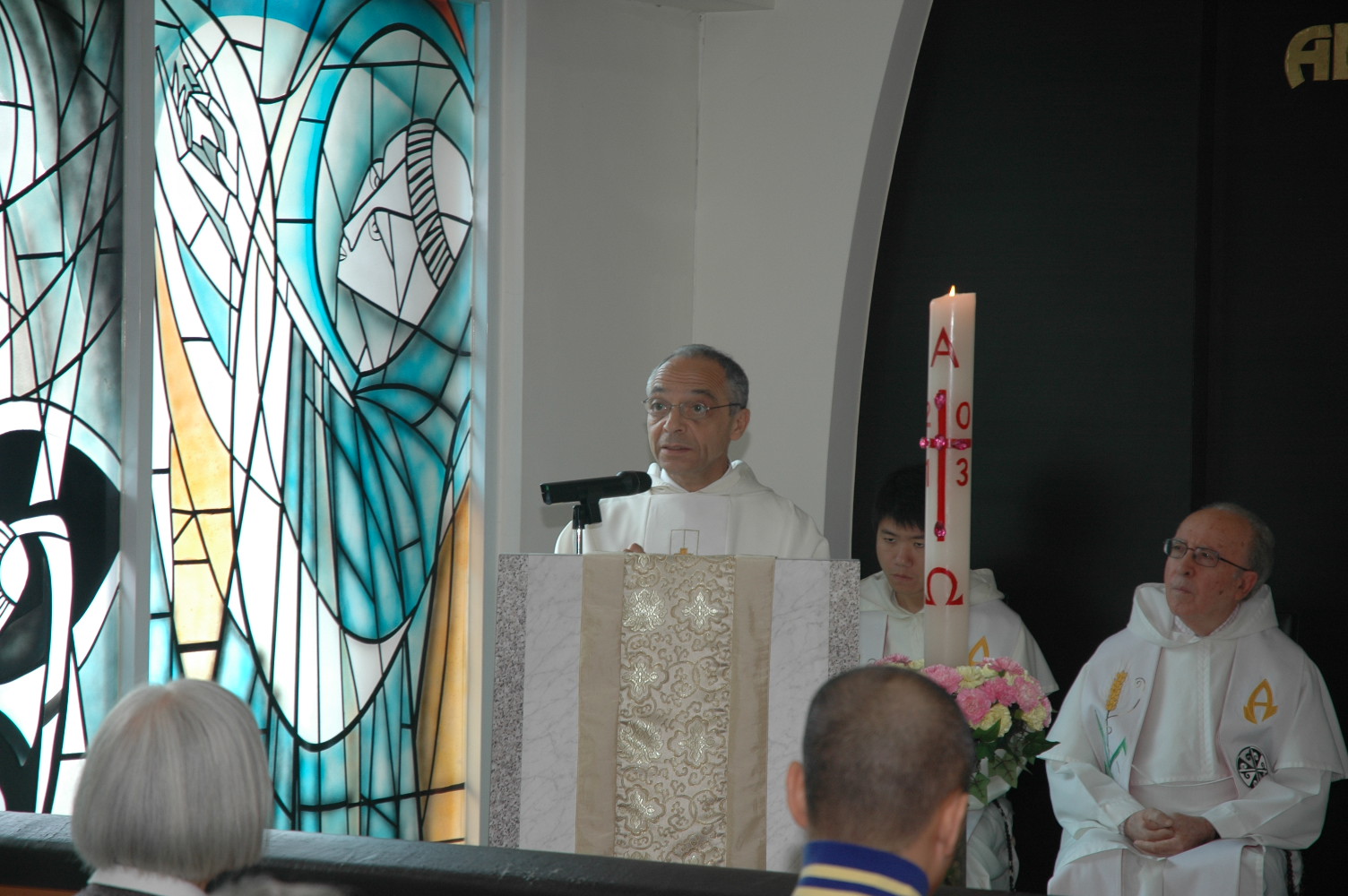
Â
(Homily of the Master of the Order in the Mass of the 6th Sunday of Easter, 2013.
See Ac 15:1-2, 22-29; Rev 21:10-14, 22-23; Jn 14:23-29)
Â
In these days after the celebration of Easter, just before the feast of the feasts (the Ascension of the Lord) we assist, in the readings of the Acts of the Apostles, at one foundational moment of the Church of Christ. Learning from this moment, as Christians, as preachers, we must not forget that our preaching is, always, to remember that we are called to found the Church of Christ by giving the Gospel to the world.
It is one foundational moment because it is the moment when the Church is built in communion. A dissension appears in Antioch, and the Church of Antioch decides to send brothers to Jerusalem so that the Apostles and the Elders help them find a good solution. These exchanges of visits between two Churches, this mutual confidence, the capacity of respect for each one, all this is factor of communion. To preach the Gospel, to announce the coming of the Reign of the Lord is to preach communion.
It is one foundational moment of the Church because starting from this common seeking of unity it is possible to affirm a conviction: It is not the circumcision which gives safety but rather the faith which directs all the believers towards the same mystery of unity. And this mystery of unity is the Word of Christ; this mystery is the Christ who is Word of the Father. To preach the Gospel is a call to open our lives to the work of the Word of the Father in the world, in each human life.
It is one foundational moment of the Church because, starting from what is called the “council of Jerusalem,†the assembly of the believers in the living Word knows that it has to reach all, beyond the known identities, beyond the borders of the usual world. The assembly of the believers discovers that it becomes the Church of Christ, the Body of Christ, when and if she opens, when and if she widens her tent to the dimensions of the world, when and if she welcomes as brothers all those who share the same faith and remain faithful to the same Word. To preach the Gospel, to announce the coming of the Reign of the Lord is to try to build, concretely, the catholicity of the Church, the universality of the assembly of Christ’s friends.
It is one foundational moment of the Church because the Church of Jerusalem recalls that one should not be lost in false criteria but rather has to refer to the essential commands, the essential necessities. And the necessities which are essential are clear: No compromising with the idols because there is only one God; no violence against life because it is the first gift of God; no illegitimate alliance because God trusts man so much that he asks him to be in this world through his human commitments, the fidelity to the covenant of friendship that he, God, wants to establish with humanity. To preach the Gospel, is to announce, and to practice, the covenant of friendship with our God and Lord.
Yes, it is one foundational moment of the Church because the Apostles and the Elders, by indicating the manner of solving the conflict in the Church of Antioch, recall what gives value to their judgment: « The Holy Spirit and ourselves »… And we then understand best the meaning of the Gospel of this day: The Holy Spirit that the Father will send in my name, will teach you everything, and will remind you all that I told you.
We are in the moments which precede the Ascension of the Lord. And Jesus tells the disciples: I am going away, and I come back. He does not say: I am going away and, later, I will come back. But he affirms that, in the same movement, he goes to the Father and comes back with him in the midst of them, and they will make their dwelling with them. The Church is established by the coming among the assembly of the believers of the mystery of unity between the Father and the Son, by the coming in the midst of them of the Fire, the Light, the Breath of the Holy Spirit. I am going and I am coming: The Son opens a new time for humanity, a time to live by the life of the mystery of the unity of the Father with the Son, the unity of the Holy Spirit. This mysterious presence makes the Church be the “memory†(it will make you remind) of the love of the Father for the world, expressed by the sending of the Son. The Church is established because, by the mystery of the work of the Holy Spirit, she is in the midst of the world as the sacrament of the covenant of God with the world, the sacrament of salvation.
FR. BRUNO CADORÉ, OP
St. Dominic’s Priory, Macau
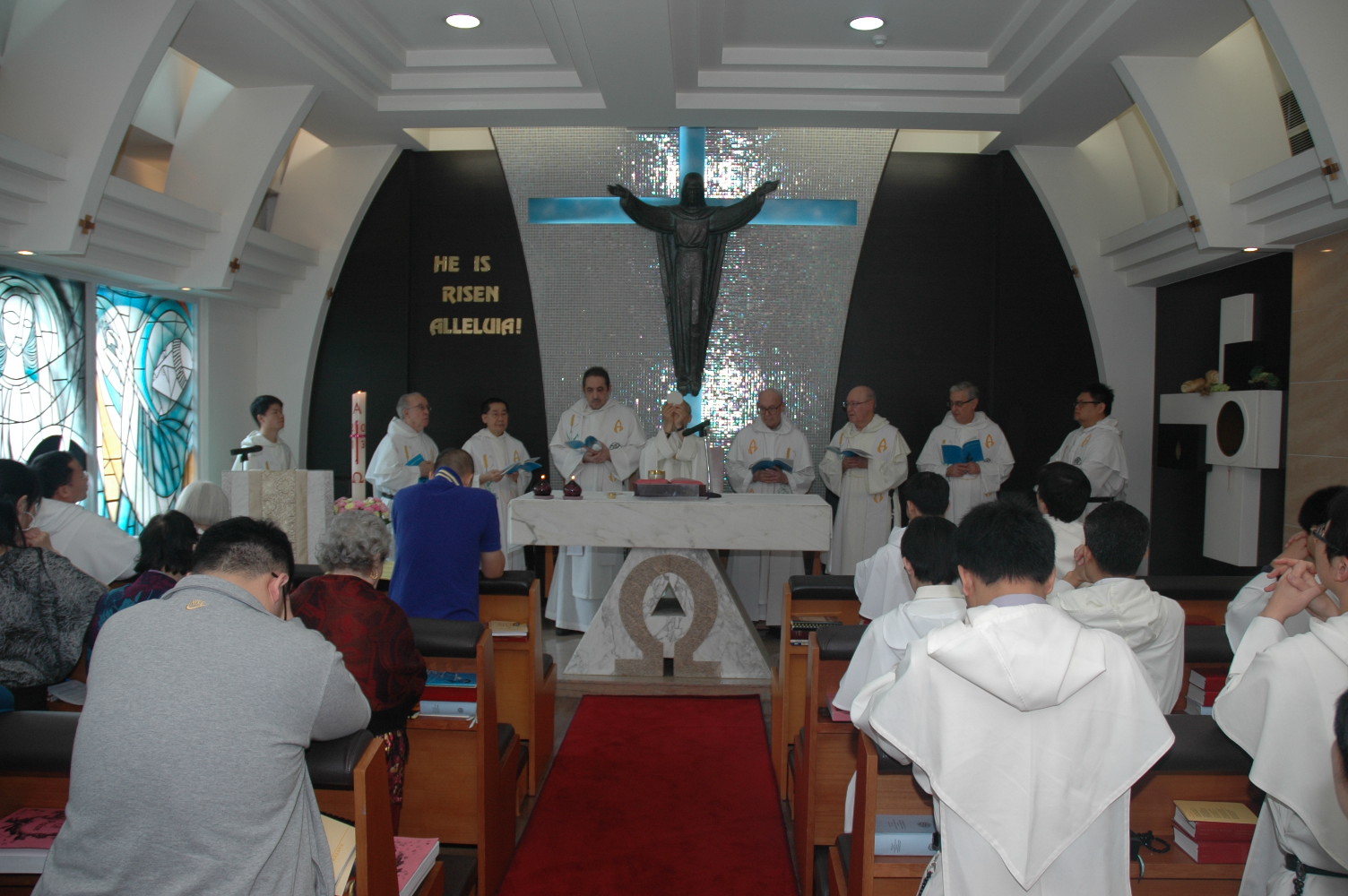
Fr. Bruno Cadoré, OP, Master of the Dominican Order accompanied by Fr. Vincent Lu Vien Ha OP, Assistant to the Master for the Asia/Pacific Region made a canonical visitation to our St. Dominic’s Priory on May 3-6, 2013. In Photo: Frs. Bruno and Vincent with the whole community
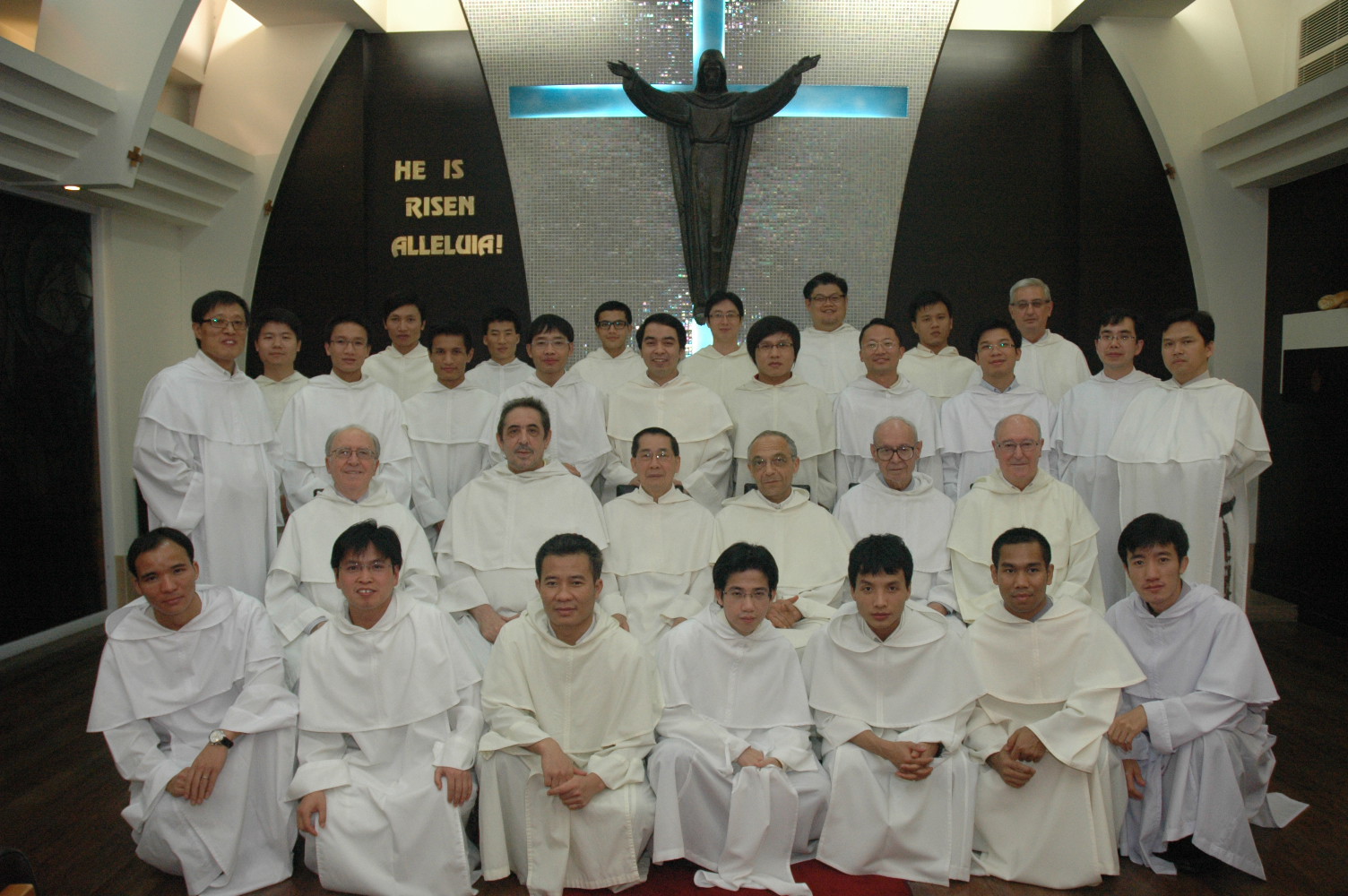
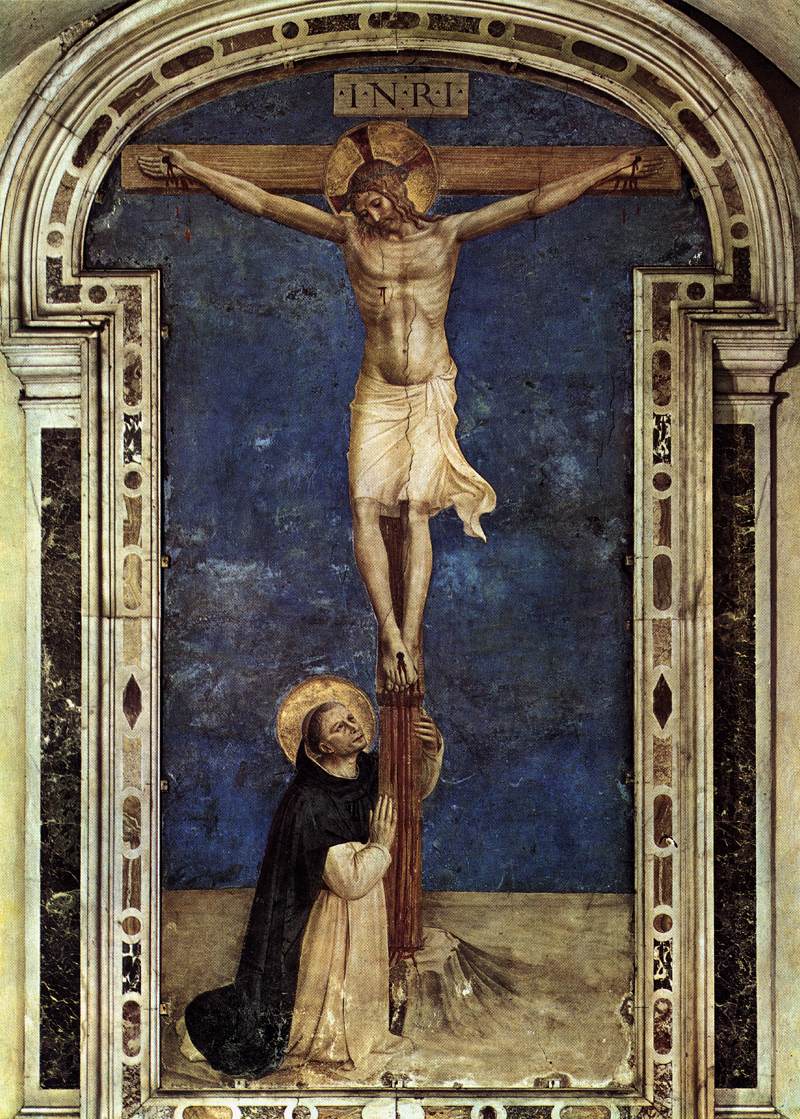
MACAO – May 02, 2013. Having been asked these days by some brothers about the global issues, such as environmental crisis, terrorism, disease, weapon of mass destruction (WMD), debt and poverty, and so forth, the topics were simply following me to the morning meditations when I thought of the Dominicans’ contemplative life as a possible solution to those issues.
 As I see it, all the global issues could be rooted in the local and individual issues of the self, which are very often more selfish than selfless. Paradoxically, human beings, on the one hand, would like to come together in unity, for there, by sharing the same values in the community, they find it happy; on the other, out of their over-ambition, self-importance and self-interest, people turn out to be the active causes of all negative issues towards the others, which later spread globally and affect the dignity and rights of all humanity, including their own. Hence, an approach to the so-called global issues from a communal perspective – that all their possible repercussions may destroy our common good – would be more Christian, relevant, and resonating with the human conscience.
 Contemplation is regarded as the foundation of the Dominican life, where the spiritual fruits rooted would then be shared for the salvation of souls, which is in fact the raison-d’être of the Dominicans. Yet, what is contemplation, one may ask, according to the Dominican tradition? Saint Dominic, the Founder of the Order, has already given us a prototype of how to act: Speaking to God and of God only. Contemplation, therefore, means speaking to God.
 Speaking to God, of course, entails the real love of God and the ability to discern the presence of God, to listen to God and to live in God. Friar Vincent de Couesnogle, when discussed about the contemplative dimension of Dominican life in 1983, saw it “a living relationship with God which, when it is intensified and prolonged, becomes a looking, a loving, a listening and welcoming of God.†A living relationship with God as such should urge God-lovers to recognize God and listen to the truths of God just around the corner, in the persons beside us. “Whoever claims to love God yet hates a brother or sister is a liar. For whoever does not love their brother and sister, whom they have seen, cannot love God, whom they have not seen†(1 John 4:20). Indeed, the truths of God are objectively true in themselves, not merely in or interfered by any human authorities, properties and sympathies. Listening and being readily to listen to the truths of God is also the Dominican profession, though!
 Truly speaking to God would oblige the contemplator to speak of God. “Seed when scattered fructifies, when hoarded, rots†– said Saint Dominic. Speaking of God alone thrusts aside the temptation to speak of oneself, usually boasting or presenting of one’s concerns, which may bore the audience and at times cause conflicts. Habitually speaking to God and of God would then give the contemplator no time falling into trivial gossips, which very often result in prejudiced judgments and hateful actions. On the contrary, a transcendental encounter with God would allow the contemplators enough charity to “do nothing from selfish ambition or conceit, but in humility regard others as better than themselves†(Philippians 2:3). Speaking of God undoubtedly compels certain work of prophecy, fraternal corrections, and just criticism for the good of the beloved, not political correctness for the sake of our own selves.
 As we have seen, Dominican contemplation would lead the contemplator to a dynamic encounter with God – the Truth, the Beauty, and the Goodness. Knowing God is the beginning of knowing and realizing oneself. By way of the Divinity humanity can thus overcome any shortcomings, differences, be connected and reunited – the common good that humans themselves at times cannot make it. Dominican contemplation is quite unlike other oriental methods of meditation, which aim at single-pointed concentration, or single-pointed analysis, or simply for a relaxation of mind. Dominican contemplation aims an intimate communion with God and a spiritual conversion of oneself out of loving God.
 In a world that is widely globalized yet deeply divided by individualism like today, an actual practice of the Dominican contemplation allows one to constantly stay in touch with God, in which relationship they certainly find solutions to their communal issues, I believe. For no one claims to really love God, saying, eagerly listening to the Truth, yet fails to recognize the truths in their neighbors, looks down on them, “kisses up, kicks down,†thinks first of their own interests and disdains the others’. In the hustle and bustle of this secularized world, Dominicans even need to practice contemplating more than ever, so that they may always be on clear conscience, able to sense the sacredness in daily life, to keep up their identity and to live up their vocation properly.
 Yet, contemplating would only be possible in solitude, in tranquility of soul, “in poor spirit†(Matthew 5:3), where those who truly long for God (cf. Psalm 42:2) can thus be satisfied and renewed in God. Suitable environment is needed for the seeds of contemplation. Positive role models are needed for the progression of contemplation. Fellow companions, as long as they are upholders, not distractors, are needed, too, for the fruits and sharing of those fruits of contemplation.
Peter Thoại, O.P.

On April 21, 2013 the Fourth Sunday of Easter, Good Shepherd Sunday, the Diocese of Macau honored priests and religious men and women who celebrate their respective anniversary: the Diamond, Golden or Silver Jubilee. The highlight of this especial celebration was the Solemn Mass presided by the Bishop of the Diocese, the Most Rev. Joseph Lai, DD, and concelebrated by thirty secular and religious priests. The Rite of Recognition and Gratitude, held after Communion, was led by the officers of the Serra Club of Macau that sponsored and organized the whole celebration. After the Holy Mass, the participants were invited to a simple and joyful agape.
This year the number of Jubilarians was sixteen: four priests Golden Jubilarians and twelve religious women – three Diamond, five Golden and four Silver Jubilarians. The priests as well as religious sisters came from different countries to work for the Kingdom of God in Macau. One of four priests is our own Fr. Jose Luis de Miguel, OP.
In his homily Bishop Lai underlined the significance of the Good Shepherd Sunday, which is the Vocation Sunday in the whole Church. He invited all the faithful that filled the Cathedral of Macau to pray for vocations to the priesthood and the religious life. He also remembered the victims of the recent earthquake in the Sichuan Province, China, of the Boston Marathon Bombings and the Fertilizer Plant explosion in West, Texas.
During the Rite of Recognition of and Gratitude to the honorees, the jubilarians received some tokens, including a cross and a diploma. The best and most appreciated gift was the enthusiastic and grateful applause of all the faithful, the laity, religious men and women and our Dominican students.
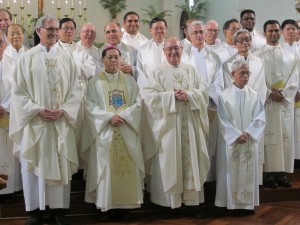
The Serra Club of Macau took care of all the details of the very successful and joyful celebration. The Serra Club is an association of Catholic lay men and women dedicated to foster and promote vocations to the priesthood, the religious life and to the lay ministry. There are about 670 Serra Clubs throughout the world. Its name refers to Blessed JunÃpero Serra, the great Franciscan missionary.
Our warmest and fraternal congratulations to all the jubilarians, our brothers and sisters in Christ! Our sincere gratitude to the Diocese of Macau and to the Serra Club!
Fr. José Luis, our dear Golden Jubilarian was ordained in Valladolid, Spain on June 30, 1963. He joined our Priory in January, 2012. He is the Moderator of our Center of Institutional Studies and the Assistant Master of Students. Our Macau Dominican community will celebrate Fr. Jose Luis’ momentous event on May 11, 2013 with a Solemn Mass in our Priory and a formal dinner in a Macau restaurant. By the way the classmates – all golden jubilarians – of Fr. Jose Luis are eleven Dominicans, including our dear Fr. Lucio Gutierrez, OP. who lived in our community for two years and is now confined at the St. Martin de Porres Hospital in Manila.







